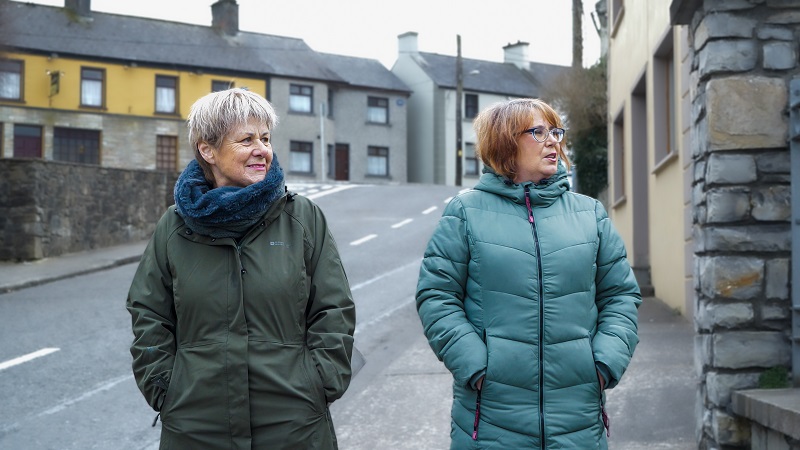Lessons from private hosting: from emergency to preparedness for future welcoming initiatives
"I wasn't alone...sometimes she cooked dinner, sometimes we went shopping together or one bought a thing or two for the other, we shared things. Together we supported and helped each other", says a host from Poland who welcomed a family who had fled Ukraine following the escalation of the international armed conflict with Russia in February 2022.
Across Europe, thousands of people have opened their homes to welcome displaced persons and families. Hosting is one example of solidarity, where relationships of mutual aid and cooperation often emerge. To support people in private homes and further understand the challenges and opportunities of hosting, we joined the Safe Homes programme together with nine National Red Cross Societies and the International Federation of Red Cross and Red Crescent Societies (IFRC) in March 2023. The programme contributed to the sourcing, matching, safeguarding, and nurturing of relationships between hosts and guests. It also offered an opportunity to reflect on good practices and lessons learned.
Throughout implementation, the main question that we have been asking ourselves is: what can we learn from this emergency response to inform long-term institutional preparedness? In other words, what are the key elements that public authorities and supporting organisations should put in place to make hosting a viable reception option for the future?

To further inform this collective reflection, we co-hosted a discussion with the European Commission on 24 April, inviting public authorities, civil society actors and volunteers from across Europe to share perspectives from their first-hand experience in supporting people seeking a new home.
“We support the European Commission Action Plan on Integration and Inclusion. It promotes models of autonomous housing, recognising the pivotal role of stable accommodation in facilitating employment and access to other rights,” said Mette Petersen, Director of the Red Cross EU Office, in her opening address.
The first panel delved into one of the main bottlenecks encountered by guests: how to transition from short term accommodation like hosting, to a more permanent solution. Everyone agreed that having a stable home is the pre-condition for integration and social inclusion. But how can this be guaranteed in the context of a long-standing housing crisis? Luis Rodriguez Calles form the Spanish Ministry of Inclusion, Social Security and Migration emphasised key obstacles faced by newcomers to access autonomous housing, like affordability, limited availability of social housing and discrimination.
For Anna, who lived with a hosting family for a few months, moving to her own apartment where her teenage kids could have privacy was paramount. In her case, the host’s network and support were instrumental. Panelists offered some examples of solutions like rental guarantees, and activating the stock of vacant properties. For the Slovak Red Cross, the social follow up with the families is just as important as the accommodation; supporting people to navigate the healthcare, employment and education systems and creating the environment for them to rebuild their lives. Without stable accommodation, it’s very hard for people to focus on other things, like enrolling their kids in school or looking for a job. Indeed, the Safe Homes programme has shown the need to think from the start about how guests will transition to a more permanent solution and the policies, investments and services that can facilitate this transition.

The second panel reflected on how to build lasting partnerships, as no institution can tackle all aspects of the reception of newcomers alone, especially during emergencies. When arriving in Hungary, people needed someone to help them liaise between public authorities and hosts, explains Veronika Nemes-Jeles, a grass-roots volunteer involved in refugee welcoming activities since 2015.
Panelists discussed the value of partnerships and what makes a successful partnership, sharing some of the problems and challenges faced. Roelie Bottema, Manager of New Aid Design at the Netherlands Red Cross, emphasised the importance of having "evolving" partnerships, as the needs change over time, and therefore, the relevant partners might change too. Liam O'Dwyer, International and Migration Advisor at the Irish Red Cross drew attention to the central role of IT infrastructure, which should be scalable in times of emergency. Their Registry of Pledges, created in 2015 to support people fleeing Syria, was put under significant pressure by the reception 21,000 hosting offers in 2022.
Throughout the discussion, all participants called to expand the scope of these types of welcoming initiatives to people with other migration status and for authorities to show a similar collective commitment to protect people in need, regardless of where they come from. Member States’ response to the displacement from Ukraine has shown some of the tangible ways to welcome strangers, most notably by facilitating rapid access to legal status. Learning from the Safe Homes programme can contribute to informing and inspiring future policies and actions that guarantee a dignified reception and integration of newcomers.
More information about the Safe Homes programme here.
For media inquiries, please contact Eva Oyón on: eva.oyon@redcross.eu or +32 2 235 09 22

